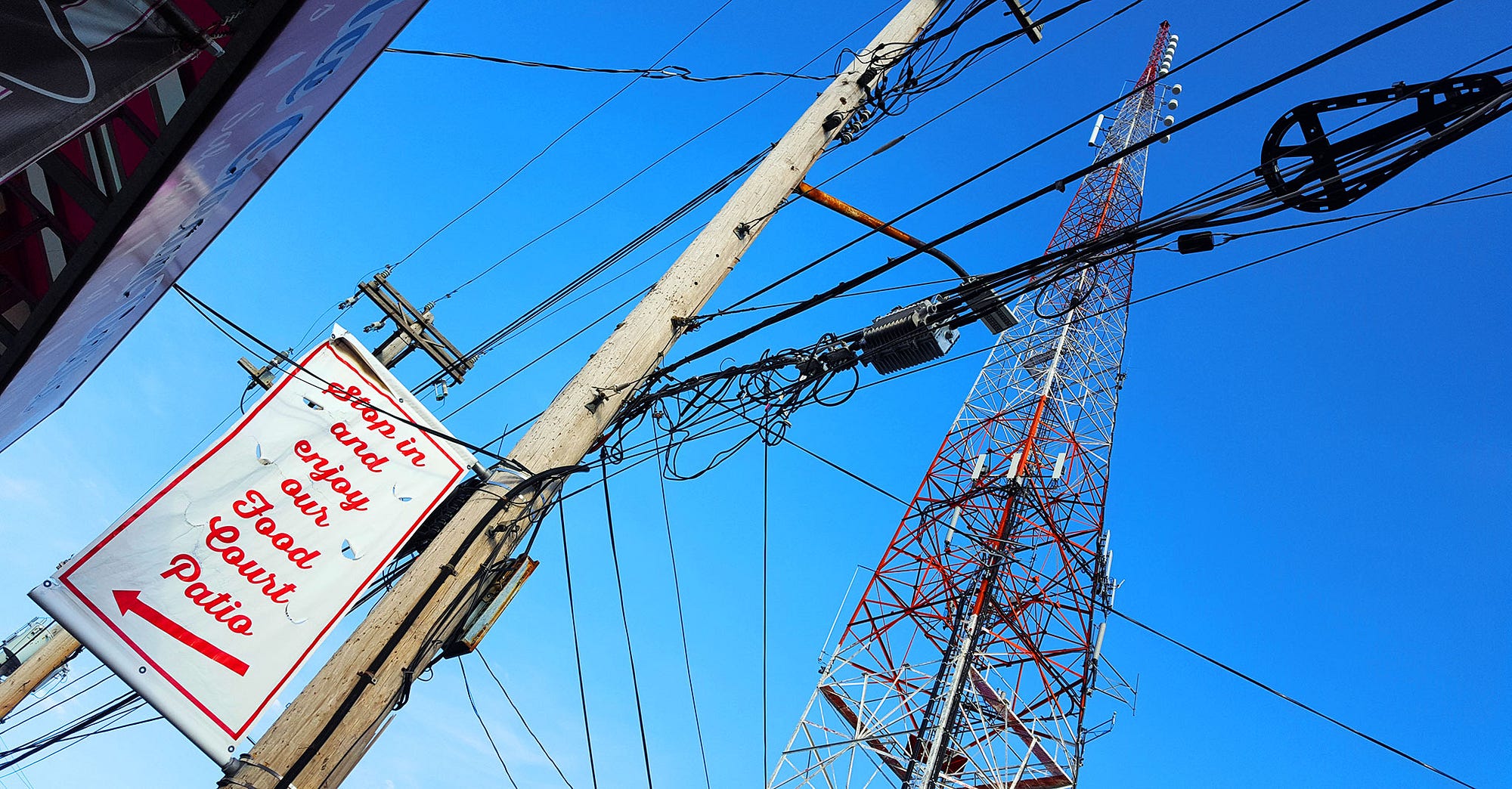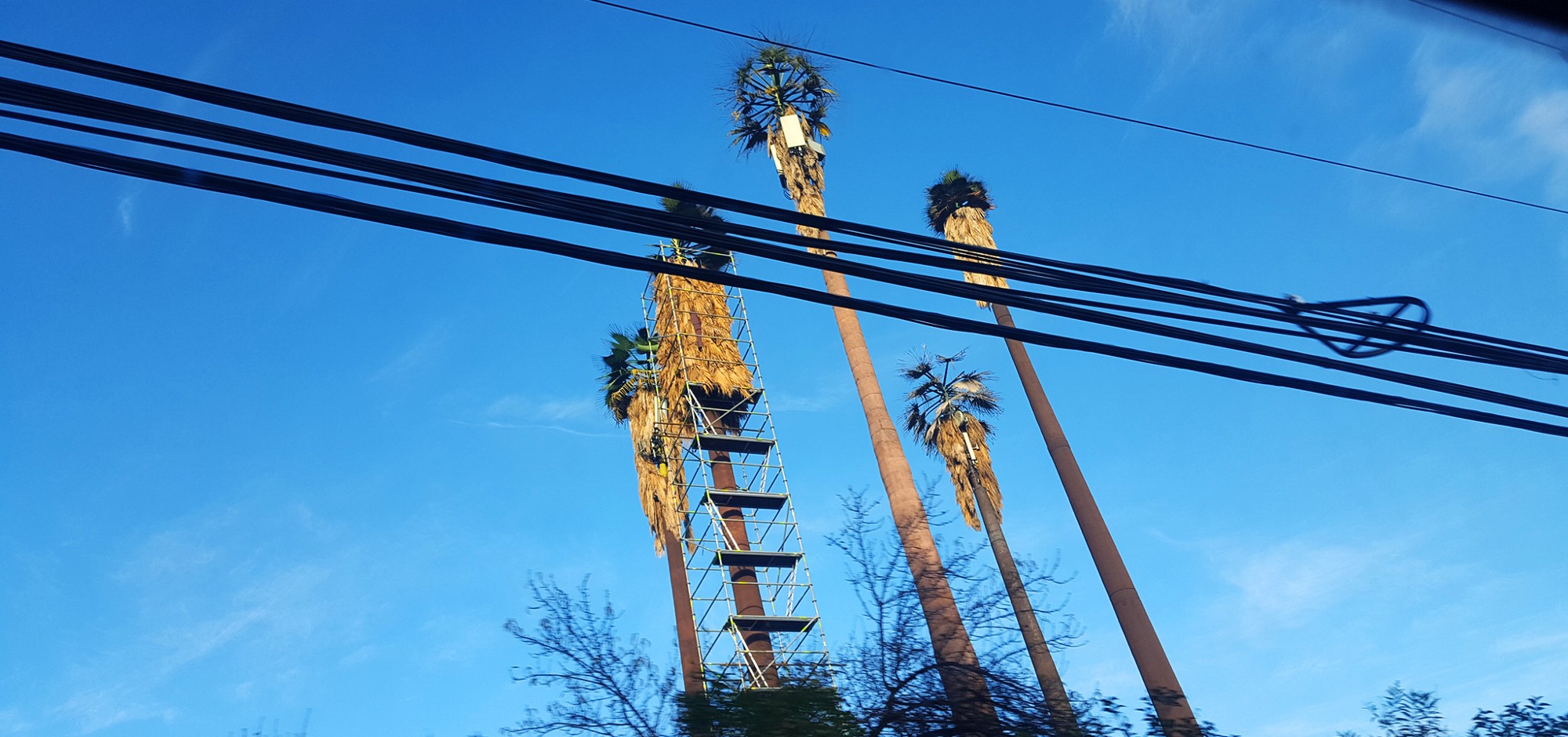
Disguised cellphone towers, Santiago, Chile. Photo by Dan Lockton
Welcome to the course, which goes by various names. If you’re an MDes student, this is 51–825 Seminar III , Advanced Interaction & Service Design Concepts— the last set of compulsory classes in your MDes. If you’re a first-year PhD student, this is 51–903, the Design Theory & Practice seminar. You’ll have slightly different assignments and expectations depending on whether you’re MDes or PhD, but we hope that by working together as a class, we’ll all benefit from a wider range of experiences and insights.
Tuesdays, 8.30–11.20am, MM 215. We will meet once a week, on Tuesday mornings. For the PhDs, we will also have a series of separate discussions (more details TBC).
Dr Dan Lockton — Office: MM 207b — danlockton@cmu.edu
Ahmed Ansari — Office: MM 207a — aansari@andrew.cmu.edu
Please note: this is a live document — the syllabus will be updated throughout the semester. Readings and things to watch will be on Box, or linked directly.
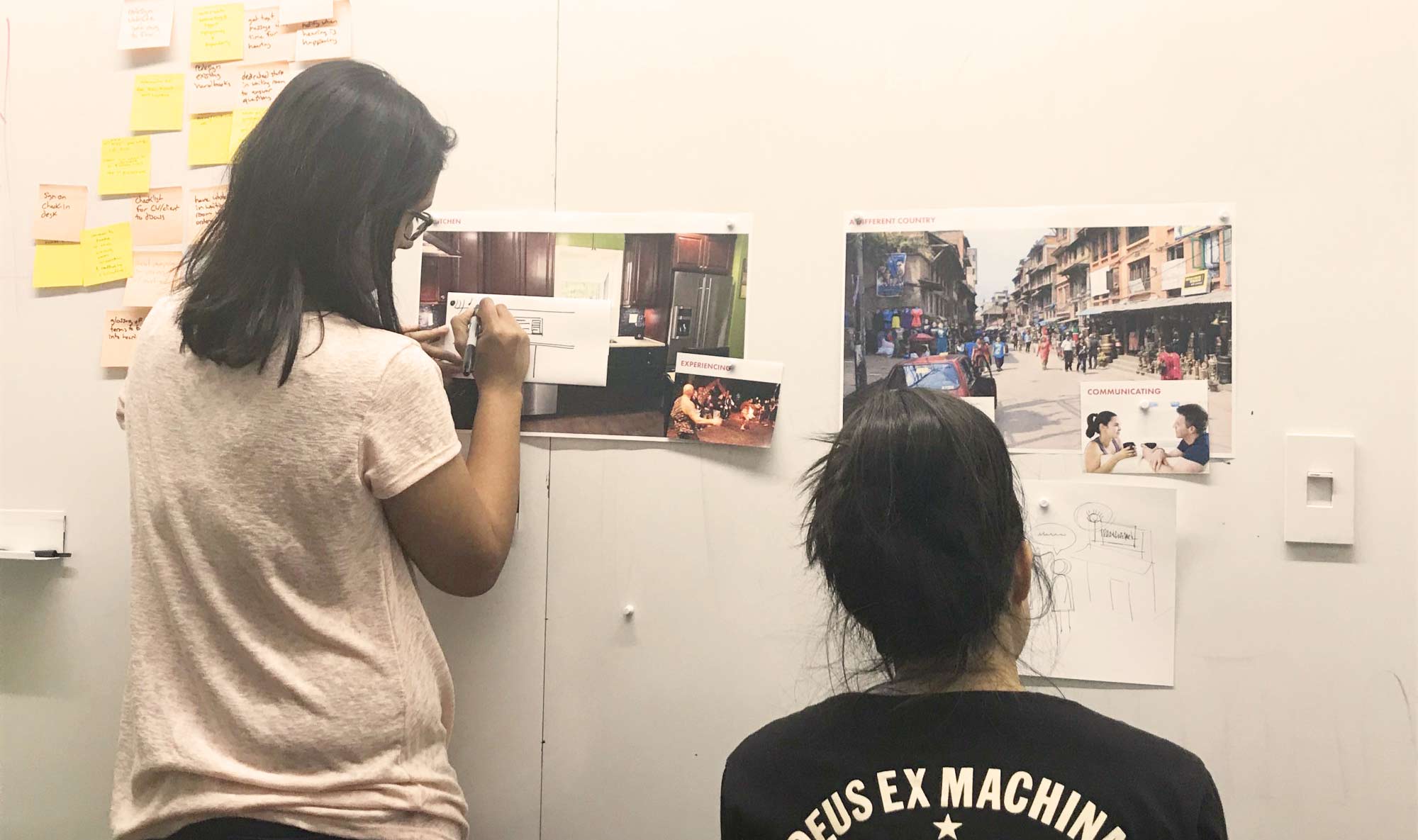
Image from a 2017 project by Nurie Jeong
Introduction to the course
Despite the course’s name, it’s not entirely in a seminar format. We will be doing a mixture of activities, from reading and writing to practical workshops and some mini-projects. Many weeks we will cover two different subjects, or do different activities, in each half of the session.
This is a ‘topics’ course — we will cover topics both within design research, interaction, and service design, and in relevant other areas, some of which link together smoothly, and others which provide different and alternative perspectives on the subject. There are a few objectives for the course:
- For MDes students, build on what you have learned in Seminars I and II and throughout your MDes so far, to give you more depth on some topics, and new perspectives on others.
- For PhD students, build on your prior knowledge and experience, to provide a foundation for your doctoral studies which covers both historical and contemporary issues in design research
- For everyone:
-
- Introduce you to — and give you an informed, rounded and reflective stance on — theory, models, themes, and new and old approaches in interaction and service design, and design research, which will give you strategic strength and confidence in your professional practice or in further academic contexts.
-
- Give you an appreciation of the characteristics of your power, as designers — its scope to influence the ways people live, but also the constraints of the sociotechnical systems within which you work — and the wisdom to deal with this responsibly.
-
- Support your work on your MDes thesis project, or the initial phases of your PhD, through giving you a set of theories and approaches which you can use practically to structure and communicate your thinking and research.
- Build up your confidence and ability in communicating and explaining your process: what you’ve done, and why, justified through reference to theory and research (your own, and others’). This can be an issue for designers, but our aim is that you will be better equipped to do this in both professional and academic contexts.
-
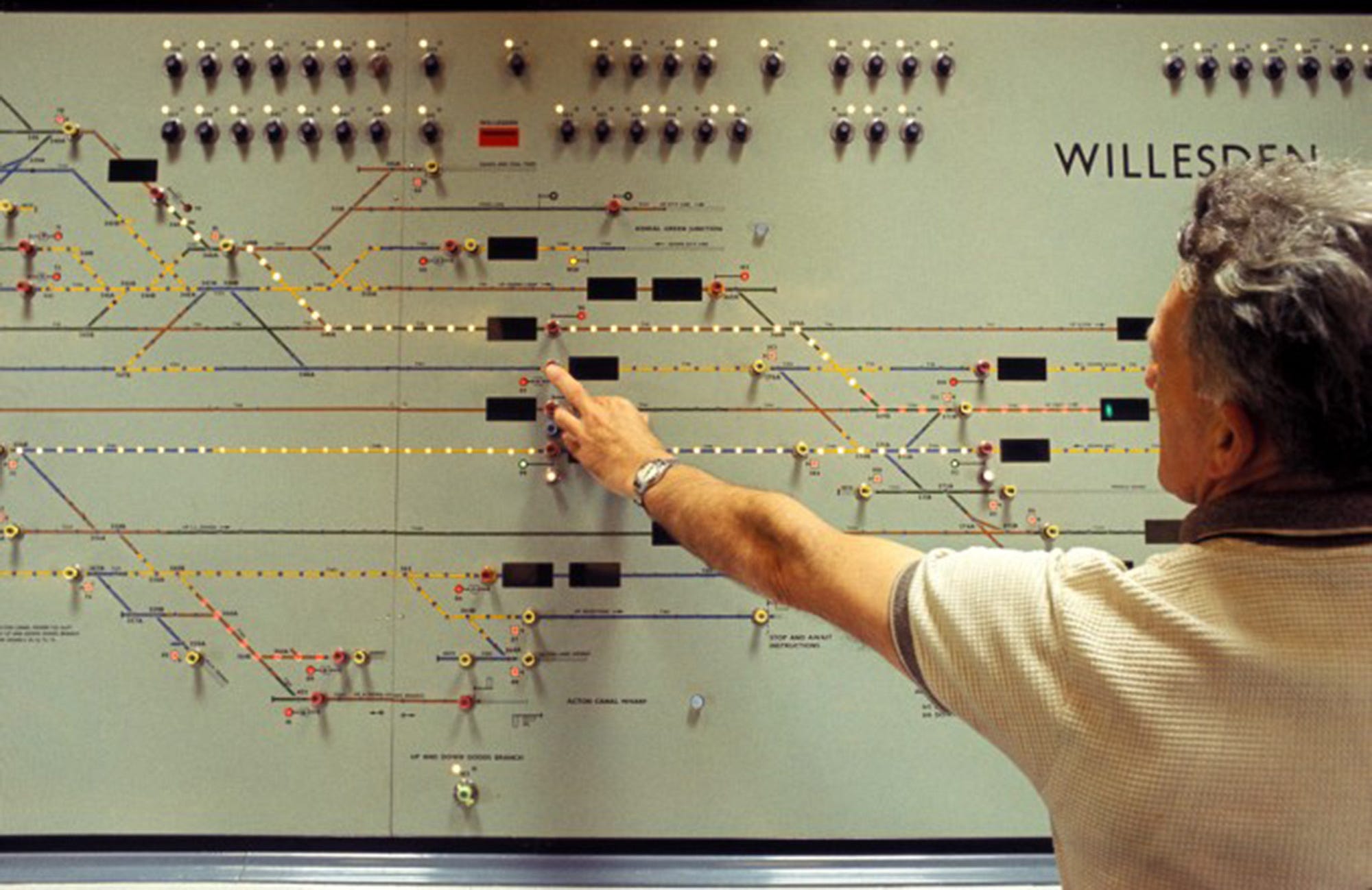
Willesden Railway Signal Box, London, 1966. British Transport Commission, used under Creative Commons Licence. © National Railway Museum and SSPL.
Course structure
We have two main parts to the course, each of which has a number of topics within it:
-
- Philosophy and Theory of Interaction and Service Design, taught by Ahmed Ansari
- Philosophy and Theory of Interaction and Service Design, taught by Ahmed Ansari
- Design Studies in Practice, taught by Dan Lockton
Here in this syllabus is an indicative outline of what we’ll be covering each week — but please note, this may change over the course of the semester. The two parts to the course interweave with each other, and we may have to adjust the schedule depending on the availability of particular guest speakers.
The course starts with a deeper dive into some of the theory (and history of thought) in the philosophy of interaction and service design, and relevant perspectives, led by Ahmed, before we explore how some of this theory might work in practice in your own projects. Although it’s a seminar series, we want you to make and be comfortable thinking through making and doing, particularly to explore some of the theory you’ll be learning, practically — and linking the topics in the seminars to your thesis projects.
Over the rest of the semester, through the Design Studies in Practice theme, led by Dan, we will explore different angles and focuses of interaction and service design research and practice, alongside helping you develop your own confidence to take strategic stances on issues. The assignments are intended primarily to help you design ways to translate and apply theory (from inside and outside of design) to interaction and service design practice and practice-led design research.
The section of the course led by Ahmed is worth 50% of your final grade; the section led by Dan is also worth 50%. The individual assignments within each half break down in different ways. It’s worth noting that this course is 12 units for MDes and 18 units for PhD students. This means that in total, including the 3-hour class, you ought to be spending either 12 or 18 hours per week on this course. There’ll be peaks and troughs, but bear this in mind.
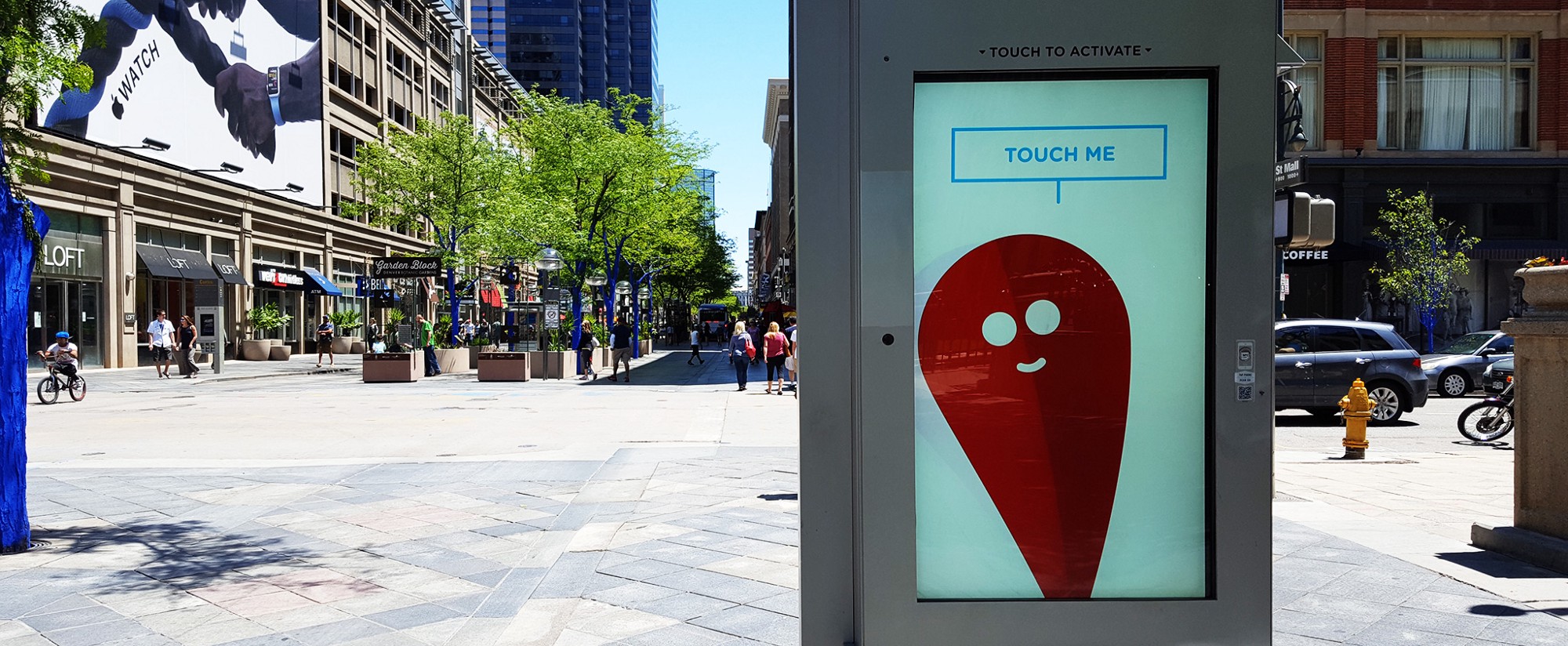
Interactive kiosk, Denver, Colorado. Photo by Dan Lockton
Week 1: Tuesday August 28
Introduction
Dan Lockton and Ahmed Ansari
Introduction to the course, and outline of the topics we’ll be covering. Get to know each other (MDes and PhD).
Philosophy and Theory of Interaction and Service Design:
Things & World 1
Ahmed Ansari
More details — including readings and information on assignments
Week 2: Tuesday September 4
Philosophy and Theory of Interaction and Service Design:
Things & World 2
Ahmed Ansari
More details — including readings and information on assignments
Design Studies in Practice: Creativity and Ideation 1
Dan Lockton
Week 3: Tuesday September 11
Philosophy and Theory of Interaction and Service Design:
Embodiment and Mediation
Ahmed Ansari
Week 4: Tuesday September 18
Design Studies in Practice: Inclusive Design and Participatory Design
Dan Lockton
Week 5: Tuesday September 25
Philosophy and Theory of Interaction and Service Design:
Craft and Care
Ahmed Ansari
More details — including readings and information on assignments
Week 6: Tuesday October 2
Design Studies in Practice: Research Through Design 1
Dan Lockton
This week we’ll be setting the project for the Design Studies in Practice part of the course.
Week 7: Tuesday October 9
Philosophy and Theory of Interaction and Service Design:
Knowing by Designing
Ahmed Ansari
More details — including readings and information on assignments
Week 8: Tuesday October 16
Design Studies in Practice: Research Through Design 2
Dan Lockton and Ahmed Ansari
This week we’ll be reviewing your initial assignment ideas and Ahmed will introduce the Cynefin model.
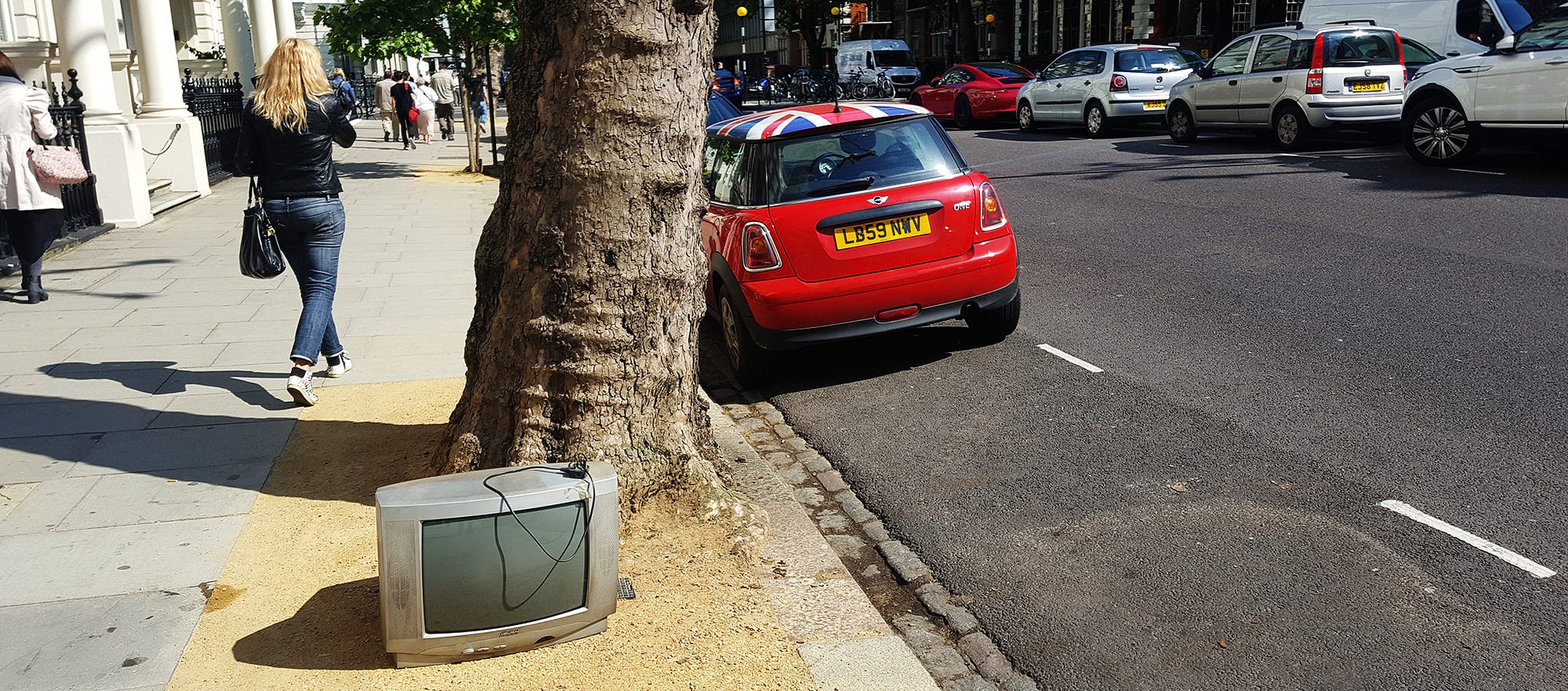
Week 9: Tuesday October 23
This week, the session will be facilitated by the PhDs and Ahmed together.
Philosophy and Theory of Interaction and Service Design:
Practices and Taste
Ahmed Ansari
More details — including readings and information on assignments
Week 10: Tuesday October 30
Philosophy and Theory of Interaction and Service Design:
Focality and Sustainability
Ahmed Ansari
More details — including readings and information on assignments
Design Studies in Practice: The Wider Field of Sustainable Design
Dan Lockton
Week 11: Tuesday November 6
Design Studies in Practice: Ethics and Side-Effects
Dan Lockton
Week 12: Tuesday November 13
Philosophy and Theory of Interaction and Service Design:
Politics and Ethics
Ahmed Ansari
More details — including readings and information on assignments
Week 13: Tuesday November 20
Design Studies in Practice: Creativity and Ideation 2
Dan Lockton
Design Studies in Practice: Critical and Speculative Approaches
Dan Lockton
Week 14: Tuesday November 27
Design Studies in Practice: Research Through Design project presentations / demos
Dan Lockton
(This is also the deadline for your projects)
Week 15: Tuesday December 4
Reflections and Synthesis
Dan Lockton and Ahmed Ansari
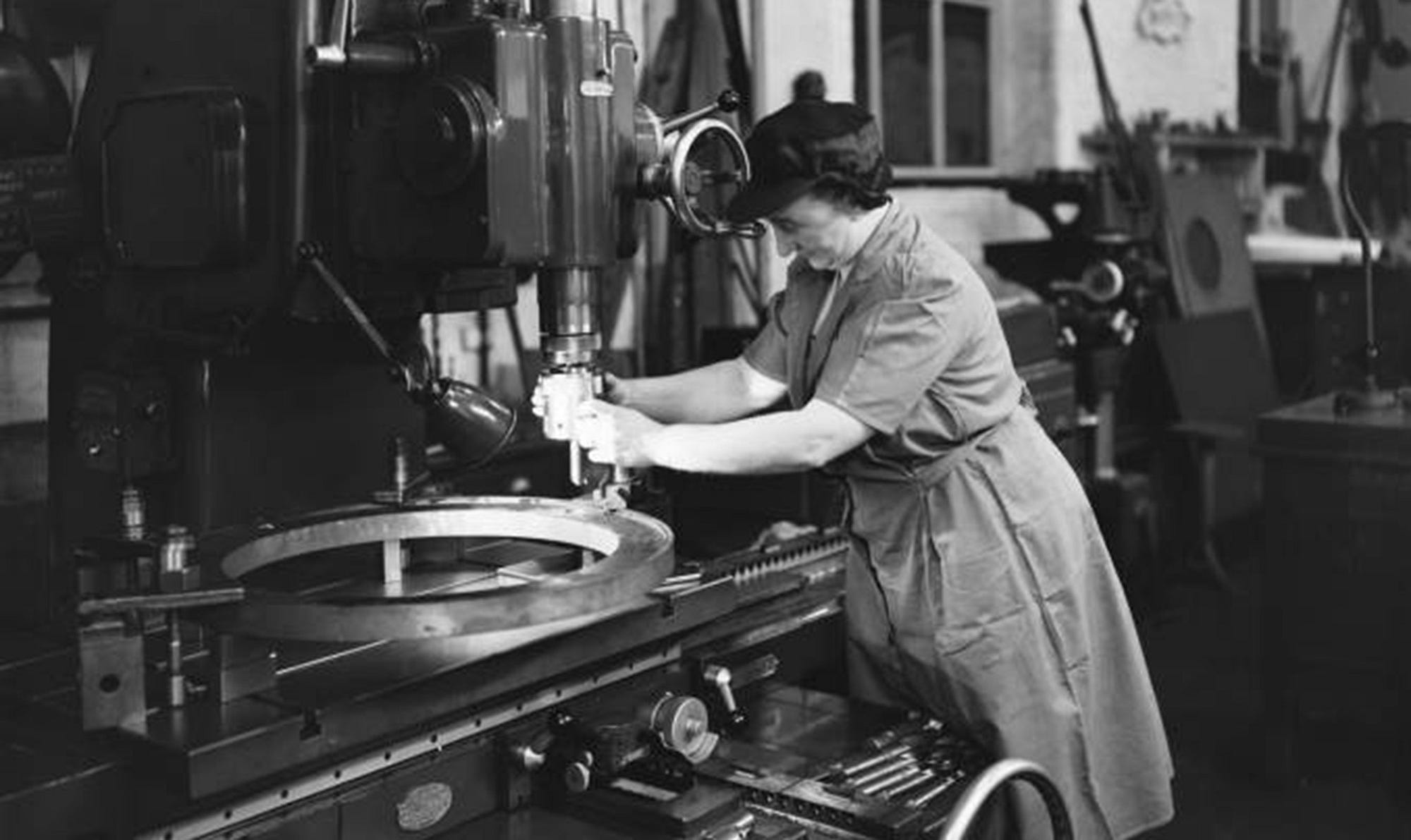 Using a drill press, London & North Eastern Railway’s Doncaster Works, 14th August 1943. Used under Creative Commons licence. © National Railway Museum and SSPL
Using a drill press, London & North Eastern Railway’s Doncaster Works, 14th August 1943. Used under Creative Commons licence. © National Railway Museum and SSPLDesign Studies in Practice
Design Studies is, broadly, the study of:
the different ways in which design has been characterized and practiced, the contexts and systems in which designs operates, and the responsibilities that come with the power of designing (link)
That’s a very broad definition, and when “design studies” is discussed by academic researchers, their interpretation ranges from design history, to examination of design’s interrelation with other subjects, to philosophical treatments of design (much as Ahmed’s section of the course approaches the subject) to ethnographic study of how design teams work, to science and technology studies. All of these are parts of the field, but generally what is not included in design studies are the skills themselves which designers use. Studying design studies is not, generally, “learning how to design” in the sense of how to use a particular tool, but it may well (and should) have an influence on how you think as a designer, how you make decisions, and how you understand your work in context. Carnegie Mellon has, traditionally, been one of the pioneering design schools in ensuring that undergraduate and graduate designers learn design studies as part of their design education, which hasn’t always been the case elsewhere.
What does “Design Studies in Practice” mean? My aim with this part of our course is to help you translate some of the theory (both that which you learn with Ahmed, and other aspects we will explore) into practically applicable ways of working: how do you apply and make use of this in your projects and research, both those you do here at CMU and others more widely in the world. Our focus for much of this part of the course is using Research Through Design as an approach to ‘do’ design studies practically.
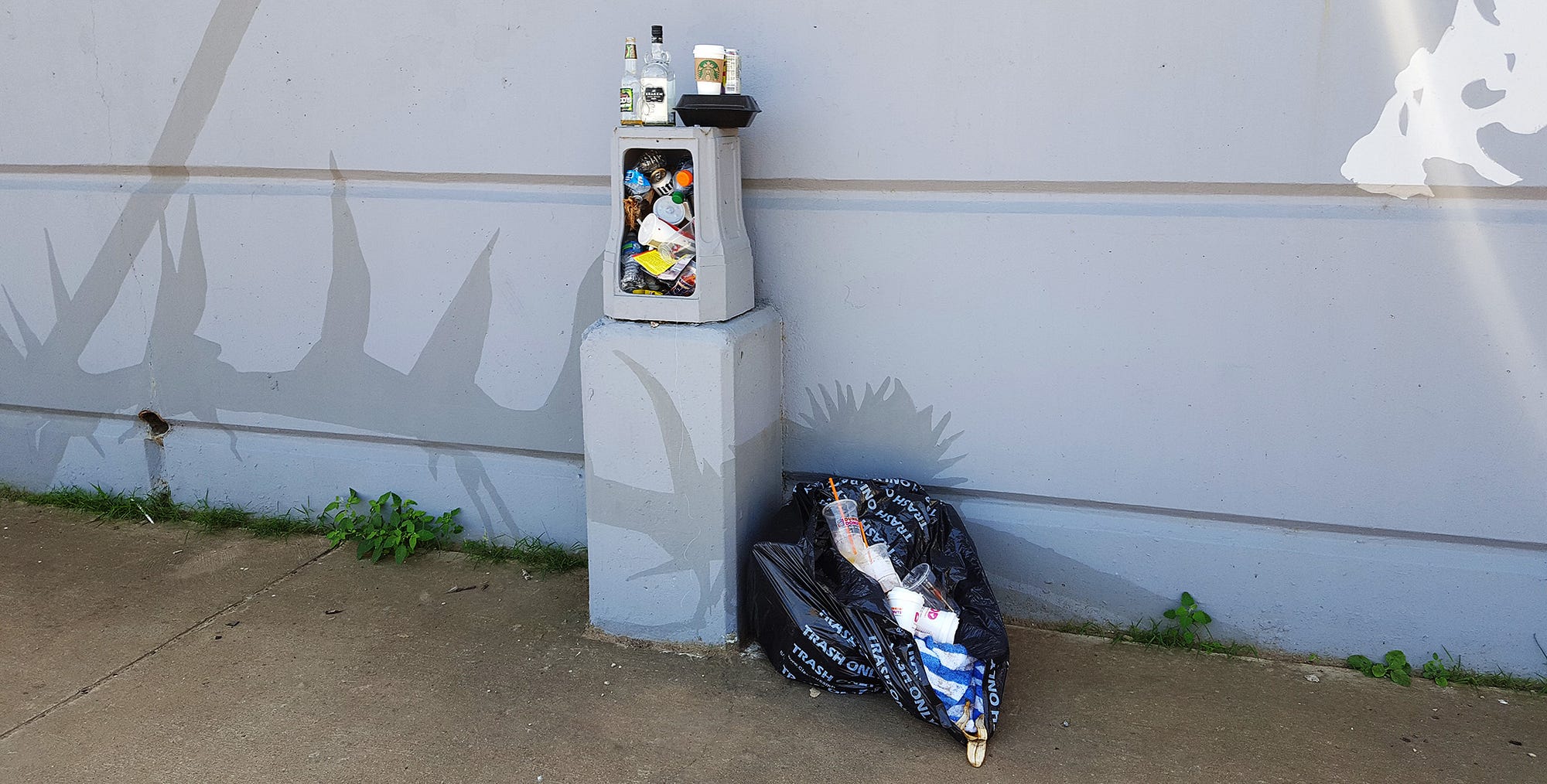 Perceived affordances, Pittsburgh. Photo by Dan Lockton
Perceived affordances, Pittsburgh. Photo by Dan Lockton
Expectations
We only have fifteen sessions together. Absences of any kind are strongly discouraged as your learning and work will be adversely affected by the information and activities you miss. Please be punctual, arriving just before the class start time, so we can begin the session promptly. If you are five minutes late or leave class early, you will be marked as absent. Two absences may cause your final grade to drop a letter. Three absences may earn you a failing grade for the course.
Please schedule doctor’s appointments, interviews, etc. for times other than class sessions. In the event that you encounter a health or life issue that requires you to miss class (such as a physician providing you with instructions that necessitate your quarantine) please notify me as soon as possible to provide an idea of the severity of your illness/issue and the length of time needed for recovery. Keep in mind, you are responsible for information you miss through absences or lateness. (Note: If your illness/issue requires recovery time that exceeds the absence policy for a passing grade, a leave of absence may need to be considered. If this becomes the case consultation with university resources on how best to support you may be necessary.)
Please bring academic timing conflicts to my attention as soon as possible and do not make travel plans before verifying the date of the event with us. While we encourage and support professional development through conferences and your search for internships and careers beyond the degree, it is also our expectation that you will balance these opportunities with the commitment you have made to your education here. You are responsible for any and all missed classes and assigned work, including team work. Please give Ahmed or Dan plenty of notice and discuss your plans with them carefully. This is particularly critical when additional days are taken for international travel. Instructors are not required to make allowances for your absences nor adjust the course schedule, so once syllabi are issued and calendars set, it is your responsibility to negotiate your absences. For team projects, it is also critical that you make these same negotiations with your fellow students, for fair completion of work according to assigned schedules and due dates. Before making travel arrangements for the end of the semester, check with Ahmed and Dan to confirm final dates for presentations, critiques and coursework submissions.
(This text is lightly modified from a new School of Design policy for Fall 2018)
 Ethernet cables in a server room in London. Photo by Dan Lockton
Ethernet cables in a server room in London. Photo by Dan Lockton
Plagiarism
It’s not worth plagiarising anything. In this course, our aims include your development of a professional stance and approach to your work, and so we want you to embody that in everything you do. Very little in the world of design (or academia) is wholly original, but the ways in which you build on and transform others’ ideas in a respectful and appropriate way include attribution, acknowledgement and referencing. It is a marker of your professionalism, and you should treat developing this skill as part of your toolbox as seriously as you do other skills.
If you use an idea, image, or text from somewhere else, acknowledge this: reference where it came from. It makes your work stronger to do this — it shows that you are professional, well-read, and alert to developments in your field. If you are quoting or paraphrasing text, do it properly.
Here are the CMU policies on academic integrity, and although they look complicated, the section on plagiarism is relatively simple. As instructors, Dan and Ahmed will have to give you zero marks for any assignment which is plagiarised, and that could have a major effect on your overall grade for the course — and ultimately, your degree.
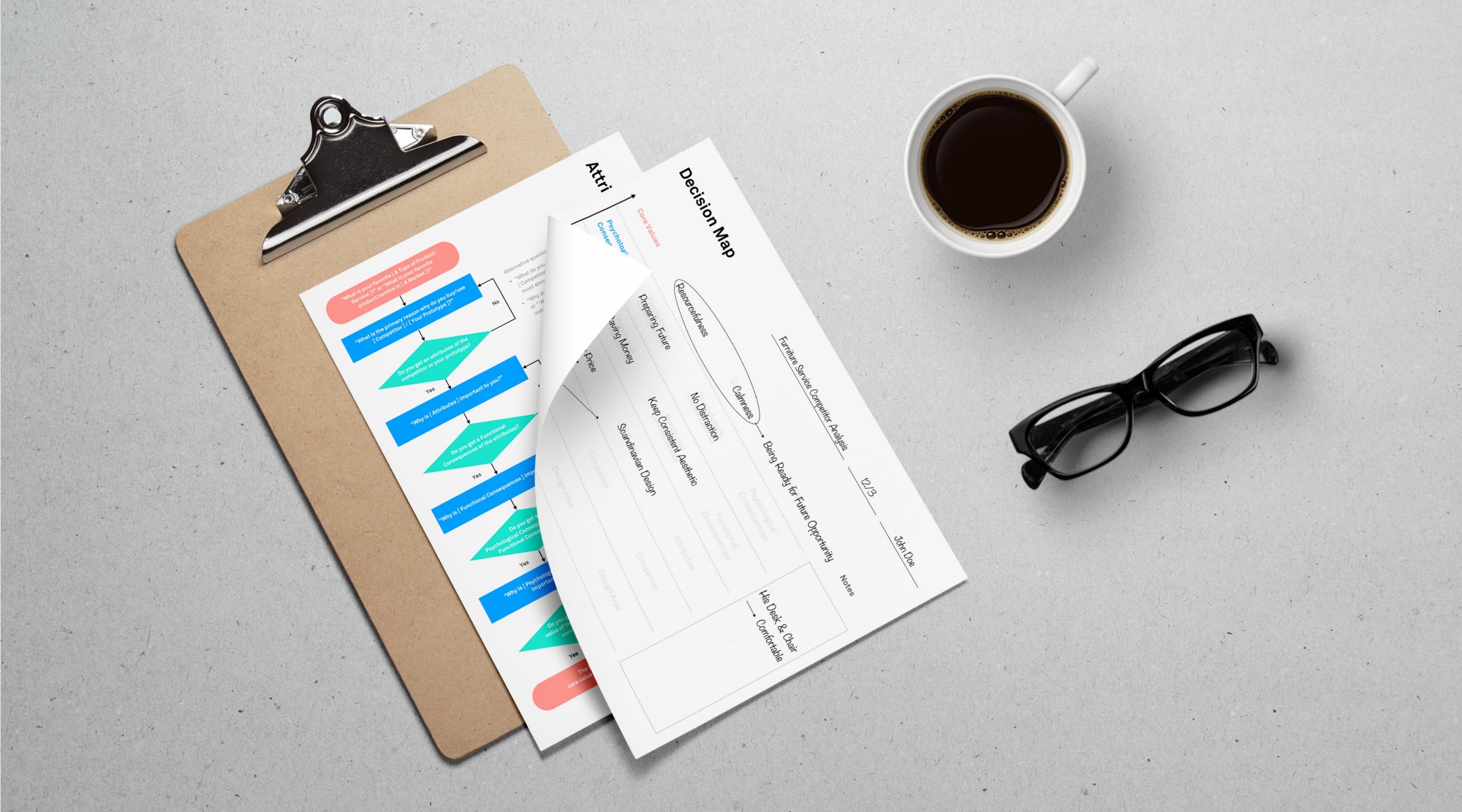
Image from a 2017 project by Bori Lee
Take care of yourself
This class is meant to be interesting, and exploratory, but as a student you are under lots of pressure from different directions. If you can maintain a healthy lifestyle this semester, it will help you achieve your goals and cope with stress. All of us benefit from support during times of struggle. You are not alone. There are many helpful resources available on campus and an important part of the college experience is learning how to ask for help (this is actually a really useful skill to develop anyway, even in less stressful situations). Asking for support sooner rather than later is often helpful.
If you or anyone you know experiences academic stress, difficult life events, or feelings like anxiety or depression, we strongly encourage you to seek support. Counseling and Psychological Services (CaPS) is here to help: call 412–268–2922 and visit their website http://www.cmu.edu/counseling/.
Consider reaching out to a friend, faculty or family member you trust for help getting connected to the support that can help. If you or someone you know is feeling suicidal or in danger of self-harm, call someone immediately, day or night:
CaPS: 412–268–2922; Re:solve Crisis Network: 888–796–8226
If the situation is life threatening, call the police:
On campus: CMU Police: 412–268–2323
Off campus: 911
If you have questions about this or your work, please let Dan or Ahmed know.
(This text is lightly modified from that provided by now-President Farnam Jahanian, based on the work of the Task Force on the CMU Experience)
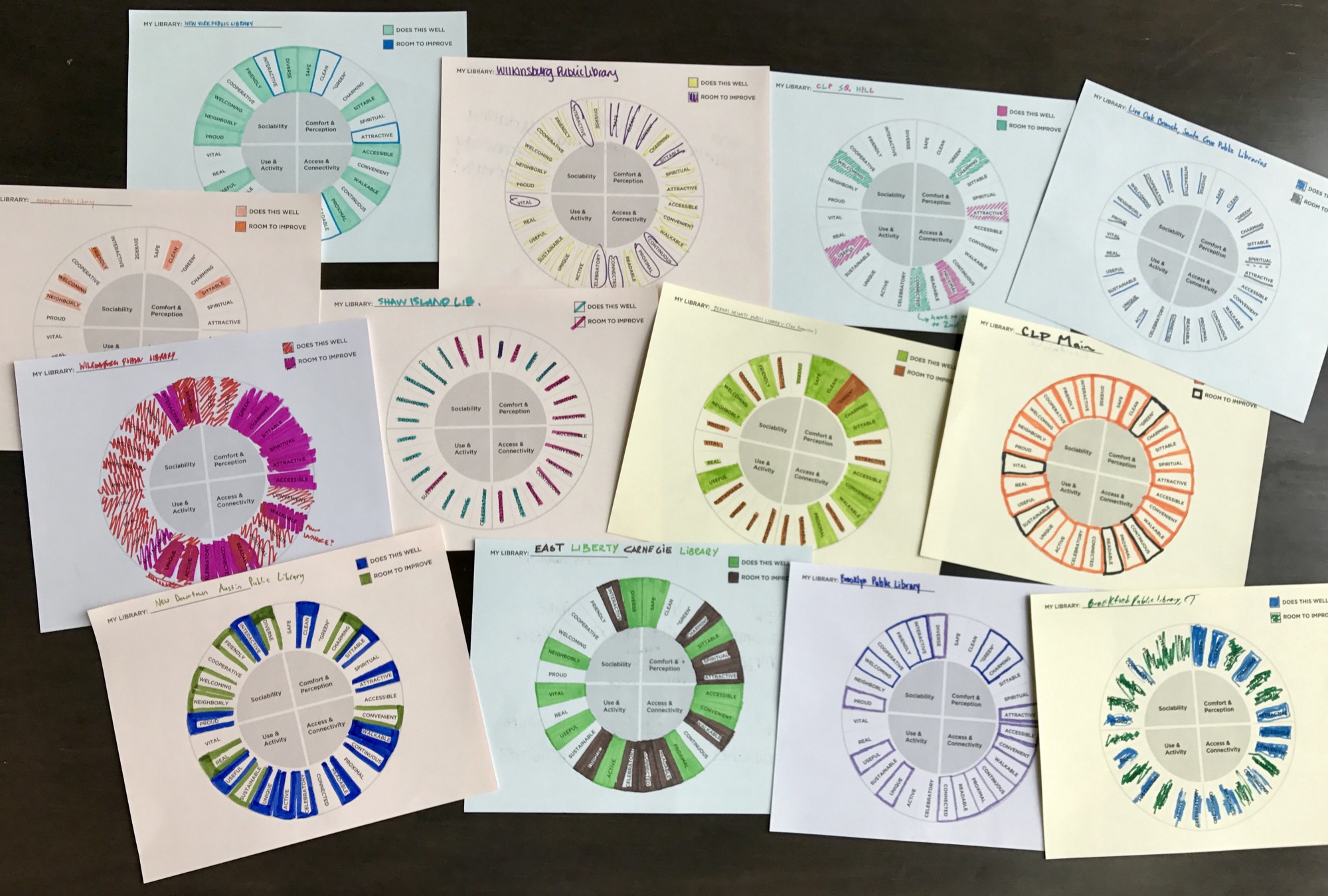
Image from a 2017 project by Julia Petrich
Accommodations for Students with Disabilities
If you have a disability and have an accommodations letter from the Disability Resources office, we encourage you to discuss your accommodations and needs with us as early in the semester as possible. We will work with you to ensure that accommodations are provided as appropriate. If you suspect that you may have a disability and would benefit from accommodations but are not yet registered with the Office of Disability Resources, we encourage you to contact them at access@andrew.cmu.edu.
(This text is lightly modified from that provided by Laurie Weingart, Interim Provost)
